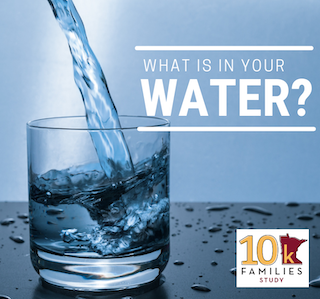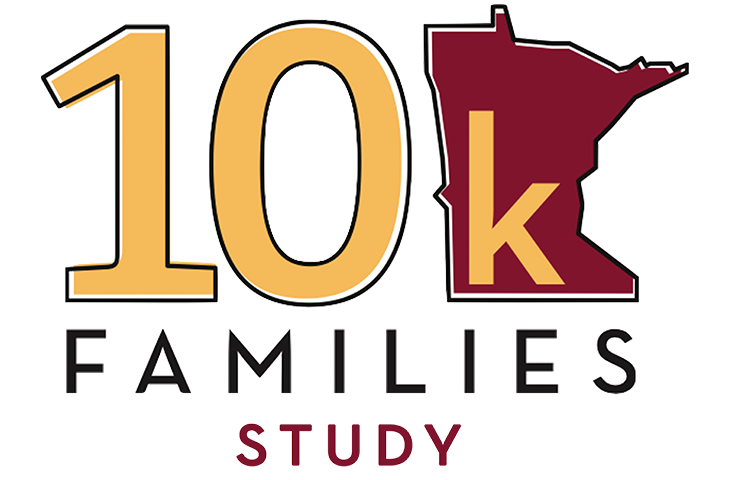10,000 Families Study Receives an NCI Grant!

10,000 Families Study Receives NCI Grant to Study Environmental Exposures and Cancer Risk
October 12, 2021
MINNEAPOLIS, MN- October 12, 2021 - A University of Minnesota-based team was recently awarded a UG3 grant from the National Cancer Institute (NCI): “The 10,000 Families Cohort: a new study to understand the environmental causes of cancer.” The 10,000 Families Study (10KFS) is a family-based study in Minnesota, the “Land of 10,000 Lakes.” This new award provides funding to investigate radon and chemicals of concern in drinking water which are suspected risk factors for hematologic cancers.
These exposures demonstrate substantial geographic variation in the state, impacting both rural and urban areas and racial/ethnic groups that are underrepresented in research to date. The new cohort study will include a detailed exposure assessment and long-term follow-up to provide clarity on whether exposure to these agents increases the risk of cancer. The UG3 grant totals approximately $2.1 million over 2 years.
The study is led by Jen Poynter, PhD, associate professor with the U of M Medical School’s Department of Pediatrics and Associate Director for Community Outreach and Engagement with the Masonic Cancer Center; Heather Nelson, PhD, MPH, professor with the U of M School of Public Health (SPH) Division of Epidemiology and Community Health and a program co-leader with the Masonic Cancer Center; and Lisa Peterson, PhD, professor with the SPH Division of Environmental Health Sciences and a program co-leader with the Masonic Cancer Center.
“This new grant is a great opportunity to study the possible role of exposure to environmental chemicals and development of hematologic cancers, including leukemia and lymphoma,” noted Dr. Poynter. “The focus on families from across Minnesota, including diverse rural and urban communities with different exposures, will allow us to draw conclusions that will benefit our entire state and beyond.”
The 10KFS was envisioned in 2017 to address the unique health needs of Minnesota. The overall goal is to gather information that can be used to develop better advice on how to live a healthy life and to guide policies to promote health and reduce illness.
“This new line of research builds on the foundational work the 10,000 Families Study team has been doing to create study infrastructure, pilot data collection methods, and reach out to communities across the state,” added Dr. Nelson. “We're excited to grow the study and work collaboratively with Minnesotans to understand how exposures today might cause cancer in the future.”
-30-
About the Masonic Cancer Center, University of Minnesota
The Masonic Cancer Center, University of Minnesota, is the Twin Cities’ only Comprehensive Cancer Center, designated ‘Outstanding’ by the National Cancer Institute. As Minnesota’s Cancer Center, we have served the entire state for more than 25 years. Our researchers, educators, and care providers have worked to discover the causes, prevention, detection, and treatment of cancer and cancer-related diseases. Learn more at cancer.umn.edu.
About the University of Minnesota Medical School
The University of Minnesota Medical School is at the forefront of learning and discovery, transforming medical care and educating the next generation of physicians. Our graduates and faculty produce high-impact biomedical research and advance the practice of medicine. We acknowledge that the U of M Medical School, both the Twin Cities campus and Duluth campus, is located on traditional, ancestral and contemporary lands of the Dakota and the Ojibwe, and scores of other Indigenous people, and we affirm our commitment to tribal communities and their sovereignty as we seek to improve and strengthen our relations with tribal nations. For more information about the U of M Medical School, please visit med.umn.edu.
About the University of Minnesota School of Public Health
The University of Minnesota School of Public Health improves the health and wellbeing of populations and communities around the world by bringing innovative research, learning, and concrete actions to today’s biggest health challenges. We prepare some of the most influential leaders in the field, and partner with health departments, communities, and policymakers to advance health equity for all. Learn more at sph.umn.edu.


